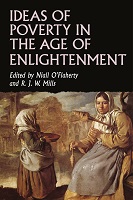Ideas of poverty in the Age of Enlightenment
Contributor(s)
O’Flaherty, Niall (editor)
Mills, R. J. W. (editor)
Collection
Knowledge Unlatched (KU)Language
EnglishAbstract
Although poverty in the eighteenth century has long been an object of focus for social historians, it has figured only marginally in the intellectual history of the period. This is because it has been assumed that the existence of poverty was rarely problematised before the transformative decade of the 1790s. Yet because the theme of poverty played important roles in many critical issues in European history, it was central to some of the key debates in Enlightenment political thought throughout the period, including the controversies about sovereignty and representation, public and private charity, as well as questions relating to crime and punishment. Indeed, leading thinkers like the Scottish political economist Adam Smith, the French Physiocrats and the Milanese jurist Cesare Beccaria had come to see the fate of the poor as an urgent political question in the middle decades of the century. This book examines some of the most important contributions to these debates, while also ranging beyond the canonical Enlightenment thinkers, to investigate how poverty was conceptualised in the wider intellectual culture, as politicians, administrators and pamphlet writers grappled with the issue. The volume also revisits the question of why and how many governments and men of letters began to address poverty as a social problem in the 1790s. It asks how far the drive to reduce or eliminate want was already underway before the French Revolution, as well as challenging the binary characterisation of debates in the period as a struggle between humanitarian radicals and cold-hearted reactionaries.
Keywords
European Enlightenment; political economy; moral economy; Enlightened absolutism; poverty; Physiocrats; paternalism; poor laws; capitalism; T. R. MalthusISBN
9781526166777, 9781526166784Publisher
Manchester University PressPublisher website
https://manchesteruniversitypress.co.uk/Publication date and place
Manchester, 2024Grantor
Classification
Poverty and precarity
History of ideas
Legal history
Social and cultural history
Western Europe
18th century, c 1700 to c 1799
Social security and welfare law
Social and political philosophy


 Download
Download Web Shop
Web Shop